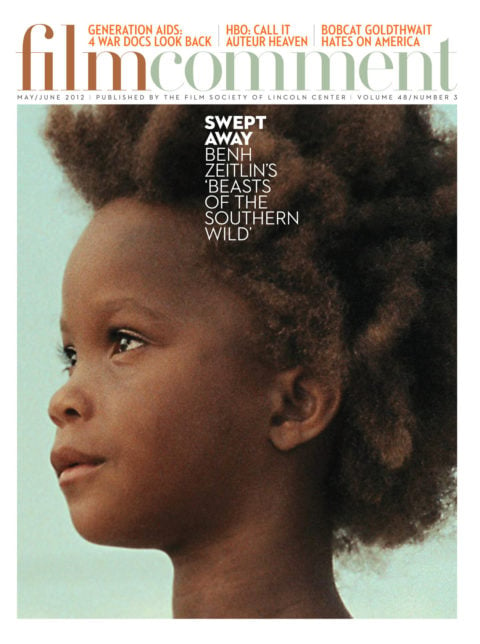
“What kind of bird are you?” A 12-year-old boy in a scout uniform asks a 12-year-old beauty decked in mysterious black feathers. That’s the beginning of the piercing love story at the heart of Wes Anderson’s Moonrise Kingdom, shown in flashback after the two have hatched a plan to run away together. A recording of Benjamin Britten’s sparkling The Young Person’s Guide to the Orchestra: Variations and Fugue on a Theme of Purcell, a composition meant to introduce children to the various musical instruments, serves brilliantly as a musical expression of how each character has a colorful role in the landscape and community.
The paint-tube-pure hues of Moonrise Kingdom evoke picture books but also reinforce subtle connections between the characters, who live on an island called New Penzance off the New England coast, in the summer of 1965. Suzy Bishop (Kara Hayward) is a troubled gamine whose dresses recall vintage Anna Karina. Sam Shakusky (Jared Gilman) is a bullied foster child and member of a Khaki Scouts troupe led by the endearing Scout Master Ward (Edward Norton). Classical music reflects the sweetness of Sam and Suzy’s affair, while Hank Williams ballads signal the call of the wilderness as well as the sadder relationships of adults such as Suzy’s parents, Mr. Bishop (Bill Murray) and Mrs. Bishop (Frances McDormand), and the police chief Captain Sharp (Bruce Willis).
When they run away, Suzy brings a kitten, a suitcase full of books about girls who have adventures, and a treasured pair of binoculars. Sam wears his dead mother’s pearl brooch, pinned to his uniform. Shadows seem to follow them, especially at moments when Moonrise Kingdom evokes darker movies. The armed Khaki Scouts who chase them through the woods are reminiscent of Lord of the Flies, and scenes set in a cove where they pitch camp under cliffs, a spot they dub “Moonrise Kingdom,” recall Karina and Jean-Paul Belmondo on the Riviera in Pierrot le Fou. But Suzy and Sam remain safe, as if they are children protected by a spell in a fairy tale.
Suzy shows Sam a book she found at home on “the very troubled child,” and he responds callously, but after she retreats into their tent he apologizes: “I’m sorry—I’m on your side.” They kiss with sublime awkwardness and dance in their underwear to Françoise Hardy songs. After their idyll is interrupted, one of Suzy’s little brothers calls her a traitor to the family. “God, I wanna be,” she says. When she and Sam escape a second time, they are passionately committed—and headed into a storm.
Moonrise Kingdom has a spontaneity and yearning that lend an easy comic rhythm, as when Sam reaches out to touch the trunk of child dressed like an elephant, or a girl in a chicken costume is glimpsed brushing her teeth. The film is almost unfailingly funny, but it also has a rapt quality, as if we are viewing the events through Suzy’s binoculars or reading the story under the covers by a flashlight.
Key to its magic is the candlelit production of Britten’s opera about Noah’s ark, Noye’s Fludde, which the town is putting on in the wonderfully named Church of St. Jack. Sam first encounters Suzy there while she is costumed as the raven Noah sends off to find dry land, and the film’s giddy denouement unfolds during an actual storm when the community has taken refuge in the church, which stands in for the ark. Children clad as paired animals—in vivid costumes inspired by Camille Saint-Saëns’s Carnival of the Animals—echo the movie’s emphasis on love, friendship, and imagination. Like The Young Person’s Guide to the Orchestra, and like Moonrise Kingdom itself, Noye’s Fludde celebrates beauty in a variety of forms and how it all can come together in a wondrous whole.








